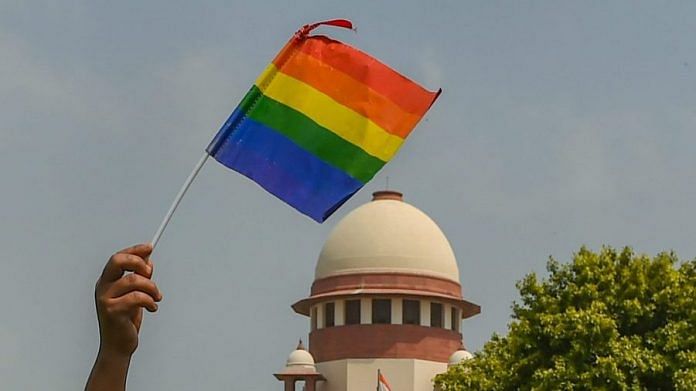New Delhi: The central government has filed a fresh affidavit before the Supreme Court, seeking to involve states and Union Territories as a party to the case pertaining to the legalisation of same-sex marriages.
The Centre told the apex court that the matter falls within the legislative domain and thus views of all states and UTs were necessary.
“It is clear that the rights of the States, especially the right to legislate on the subject will be affected by any decision on the subject. It is submitted that further, various States have already legislated on the subject through delegated legislation, therefore making them a necessary and proper party to be heard in the present case,” the affidavit stated.
It further said: “It is submitted that the said issue goes to the root of the present matter and has far reaching implications. It is therefore humbly requested that all States and Union Territories be made a party to the present proceedings and their respective stance be taken on record and in the alternative, allow the Union of India, to finish the consultative process with the States, obtains their views/apprehensions, compile the same and place it on record before this Hon’ble Court, and only thereafter adjudicate on the present issue.”
A Constitution Bench led by Chief Justice (CJI) D.Y. Chandrachud on Tuesday started hearing a batch of petitions demanding legal recognition to same-sex marriages. The other members of the bench are justices Sanjay Kishan Kaul, S. Ravindra Bhat, P.S. Narasimha, and Hima Kohli.
Solicitor General Tushar Mehta told the court Wednesday that the Centre had written to all chief secretaries for views of the states.
The Centre on Tuesday vehemently urged the Supreme Court to first consider its preliminary objection to it going into a matter which was the Parliament’s responsibility.
“I am sorry Mr Solicitor, we are in-charge,” Chief Justice Chandrachud told Tushar Mehta, who was appearing for the Centre.
The five-judge bench said the court would hear the petitioners’ side first and the nature and tenability of the preliminary objection will depend upon the canvas which the petitioners would open up.
The top court also said it would “steer clear of personal laws” during the hearing Tuesday. Setting down the “remit” of the matter, the bench observed that even though the petitioners came with a “broader canvass,” it was “unwilling to go into it.”
CJI Chandrachud also asserted that the issue was “complex” and added that the notion of a man and a woman was not “an absolute based on genitals”.
The bench indicated that it may only confine itself to the interpretation of the Special Marriage Act (SMA) to include the term “person” instead of man and woman.
“We are not willing to go into personal law issues. Remit will thus have to be restricted only to the extent we are willing to consider the issue,” the bench told the counsels appearing for petitioners as well as the respondents, which include the central government, religious bodies and individuals who are opposing the petitions.
The first petition in connection with same-sex marriage was filed in November 2020, almost two years after the Supreme Court read down Section 377 of the Indian Penal Code (IPC) to grant legal validation to homosexuality in India.
Subsequent petitions have sought recognition of same-sex marriage under community-specific laws, particularly the Hindu Marriage Act (HMA), which is followed by Buddhists, Sikhs, Jains and all the sects of Hinduism.
It is argued that the HMA does not differentiate between heterosexual and homosexual marriages in its wording. According to Section 5 of the HMA, a marriage may be “solemnised between any two Hindus”. Section 5 lists the conditions for marriage.
Also read: LGBTQ members shouldn’t be stigmatised but be assimilated with society, petitioner argues before SC



